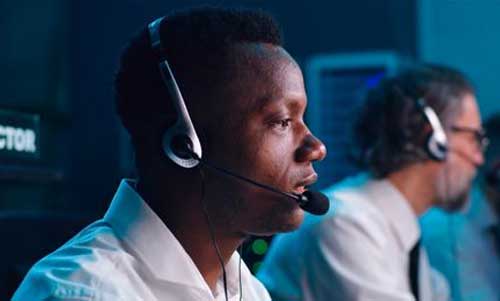Pass the 911 Dispatcher and CritiCall Practice Test on Your First Try
Your job as an emergency dispatcher is critical to the health and safety of your community. However, most candidates take these tests without prior experience and end up stressed, overwhelmed, and making costly mistakes. Because practice is essential to your success, we’ll break down each dispatcher test and what is expected to pass each one.
By having a blueprint of each test and how to best prepare, you will significantly increase your ability to receive great scores on each of the dispatcher tests you take.
What is the 911 Dispatcher Test?

The dispatcher test is a series of exams to screen candidates for 911 operator and emergency dispatcher jobs. These are the CritiCall test, the POST test, and the Police Communications Technician exam. The tests include exercises in typing, reading comprehension, map reading, speech recognition, and more, all with strict time limits, which simulate real emergency situations that you’ll have to navigate.
Learn what is on the 911 Dispatcher Test
What is the CritiCall Test?

This exam replicates day-to-day tasks that dispatchers are required to do in order to imitate the urgency of real-life emergencies. Most public safety agencies use the CritiCall test to evaluate applicants, and individual departments can set their preferred passing scores for each section. If you’ve never worked as a dispatcher or taken this exam before, proper preparation can make all the difference in your performance on test day.
What Are The Sections Of The CritiCall Test?

- Typing – A quick typing test that measures your words per minute and accuracy.
- Decision Making – Determine which emergency agency to send to a scene.
- Data Entry – Quickly enter information, such as names, license plate numbers, addresses, telephone numbers, and more into the appropriate boxes.
- Call Summarization – Listen to stories and details about people, summarize calls, and enter information into the appropriate boxes.
- Cross Referencing – Use information, like names and phone numbers, from an address book list and enter it into the appropriate boxes. Simultaneously respond to emergency messages that appear at the bottom of the screen at the same time. Failure to answer messages in 15 seconds results in a lower score.

- Memory Recall – One of the most challenging sections of the CritiCall test. Taking notes will automatically result in a failing score. Exercises in this portion include word pair matching, recalling phone numbers in the exact order given, listening to audio recordings, and typing the information provided.
- Prioritization – Place information in order of priority based on the rules provided.
- Map Reading – Read a map to determine the direction of travel as well as the fastest route to reach a destination.
- Sentence Clarity – Choose which sentence is written more clearly.
- Reading Comprehension – Assess your ability to comprehend information. Each question includes a 100-150 word passage followed by a multiple-choice question with four answers.
- Spelling – Type the word missing from the audio sentence.
- Character Comparison – Assess your accuracy and attention to detail. Match a string of letters and numbers to one of four alternative strings that is an exact match.
- Math Test – Solve simple job-related problems, including basic arithmetic, percentages, distance, time, and speed word problems. Calculators are not allowed.
Practice for the CritiCall Test or try a FREE CritiCall Test
What is the POST Dispatcher Test?


- Memory – Evaluates your ability to recall information.
- Perceptual Ability – Evaluates your speed and accuracy when processing information while multitasking.
Time limitations may be the most challenging aspect of any given test, especially without prior experience or practice. Investing in the POST Dispatcher Exam practice program will significantly improve your preparedness and alleviate the anxiety of the time restraints while testing.
Find out more about the California POST Dispatcher Test.
What is The Police Communications Technician Exam?

An NYPD 911 operator’s job is much more than just answering phones. You’re required to know every department and its policies in order to update response teams in real time. You must handle multi-communication systems, so understanding them inside and out is essential. In addition, you must know the city’s geography, how to perform CPR, and have basic first aid knowledge should there be a need to advise a caller over the phone.
The Police Communications Technician Exam will test all these skills, and because you can only take them once a year, it’s essential to practice them until they become second nature. The higher you score on this exam, the higher on the hiring priority and interview list you’ll be.
What Does The Police Communications Technician Test Include?

The Police Communications Technician Exam is broken up into seven sections:
- Written Comprehension – Evaluates your understanding of information through analysis and summarization of provided passages.
- Written Expression – Evaluates your ability to make clear, concise, accurate, and grammatically correct statements with writing exercises.
- Memorization – Recall words, numbers, and pictures with various memory exercises.
- Problem Sensitivity – Identify an emergency situation, what the problem is, how it was created, and any elements that can provide additional information about the problem in order to resolve it.

- Deductive Reasoning –Apply the appropriate given rule to each specific situation. Then, find logical solutions to questions using the presented rules and procedures.
- Inductive Reasoning – Find a link between items in a set. Each series may give you objects, people, and/or events.
- Information Ordering – Correctly organize words, numbers, letters, sentences, pictures, or simple math problems using the rules or procedures provided.
Find out more about the NYPD Police Communications Technician Exam

 Joseph Libowsky,
Joseph Libowsky,